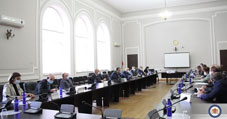
Preparatory meeting of Geneva International Discussions held at MFA
By Khatia Bzhalava
Tuesday, November 24
On November 23, a preparatory meeting of the 51st round of Geneva International Discussions was held at the Ministry of Foreign Affairs of Georgia with co-chairing EU, OSCE, and UN representatives. According to the ministry, the meeting was chaired by the deputy minister of Foreign Affairs, Lasha Darsalia.
During the meeting, issues of frequent provocations from the Russian side against the backdrop of the pandemic were sharply raised, including the cases of so-called borderization and unlawful detentions, “which further aggravates safety and humanitarian conditions on the ground.”
As the statement published by the ministry reads, the deputy minister expressed concerns over the arrest of Mirian Taziashvili by the occupation regime, on November 20th near the Zardiantakari village. Special attention was also devoted to the cases of Zaza Gakheladze, Genadi Bestaevi, and Irakli Bebua, who are being illegally detained.
The Georgian delegation noted that the recent death of Onise Gafrindashvili, a doctor living in the Akhalgori region, once again highlights the dire humanitarian condition in Tskhinvali as a result of the closure of the occupation line, including in terms of restricting access to the emergency medical services. It was remarked that due to long-term closure of the so-called crossing-points, people living in the region of occupied Tskhinvali are kept in complete isolation, “which poses a threat to the lives of the local population,”
As Darsalia noted, the Russian Federation and its occupational regimes proceed to manipulate human rights and politicize humanitarian issues. The deputy minister also focused on the regular violations of the 2008 ceasefire agreement by the Russian side, including the ongoing unlawful militarization and military training in the regions of Abkhazia and Tskhinvali.
According to the statement, during the meeting, the issues of restriction on free movement in the occupied territories, a ban on education in the mother tongue, and discrimination towards ethnic Georgians were discussed. The Georgian delegation raised the issues of the need for justice in the cases of the murders of Davit Basharuli, Giga Otkhozoria, and Archil Tatunashvili. In this regard, the meeting focused on the murder of Inal Jabiev in Tskhinvali, “which clearly shows an extremely difficult human rights situation in the occupied regions.”
As Darsalia noted at the meeting, the difficult situation on the ground represents the need to achieve progress on the main topics on the agenda of the Geneva International Discussions, which are non-use of force, the establishment of international security mechanism, safe and dignified return of IDPs. The deputy minister of Foreign Affairs emphasized the need for the Russian Federation to fulfill the August 12, 2008 ceasefire agreement.
According to the ministry’s statement, in the context of disruption of the round of Geneva talks scheduled for October by Russian representatives, the head of the Georgian delegation stressed the critical need to conduct talks in December. The need to restore Incident and Response Mechanisms (IPRM) meetings in Gali was emphasized as well.


